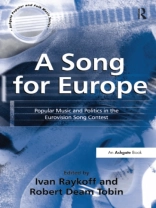The world”s largest and longest-running song competition, the Eurovision Song Contest is a significant and extremely popular media event throughout the continent and abroad. The Contest is broadcast live in over 30 countries with over 100 million viewers annually. Established in 1956 as a televised spectacle to unify postwar Western Europe through music, the Contest features singers who represent a participating nation with a new popular song. Viewers vote by phone for their favourite performance, though they cannot vote for their own country”s entry. This process alone reveals much about national identities and identifications, as voting patterns expose deep-seated alliances and animosities among participating countries. Here, an international group of scholars from a variety of disciplines, including musicology, communications, history, sociology, English and German studies, explore how the contest sheds light on issues of European politics, national and European identity, race, gender and sexuality, and the aesthetics of camp. For some countries, participation in Eurovision has been simultaneously an assertion of modernity and a claim to membership in Europe and the West. Eurovision is sometimes regarded as a low-brow camp spectacle of little aesthetic or intellectual value. The essays in this collection often contradict this assumption, demonstrating that the contest has actually been a significant force and forecaster for social, cultural and political transformations in postwar Europe.
Ivan Raykoff & Robert Deam Tobin
A Song for Europe [PDF ebook]
Popular Music and Politics in the Eurovision Song Contest
A Song for Europe [PDF ebook]
Popular Music and Politics in the Eurovision Song Contest
购买此电子书可免费获赠一本!
格式 PDF ● 网页 216 ● ISBN 9781351577991 ● 编辑 Ivan Raykoff & Robert Deam Tobin ● 出版者 Taylor and Francis ● 发布时间 2017 ● 下载 3 时 ● 货币 EUR ● ID 5326576 ● 复制保护 Adobe DRM
需要具备DRM功能的电子书阅读器












